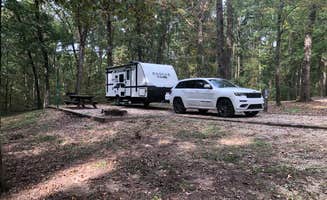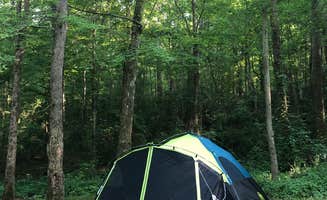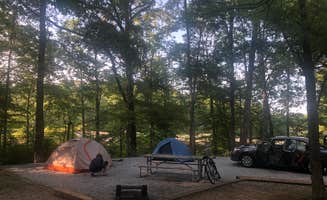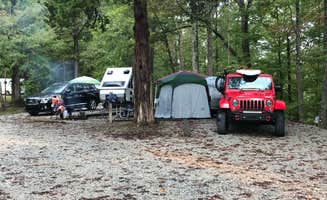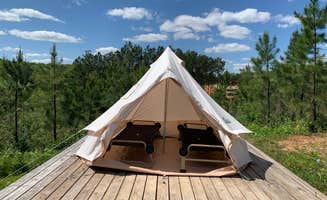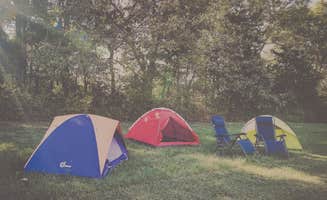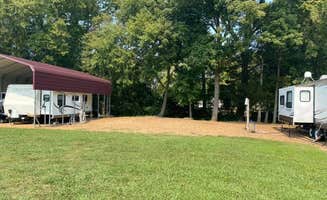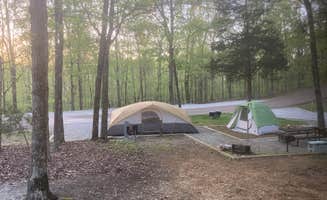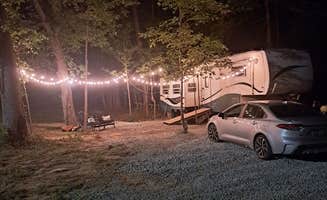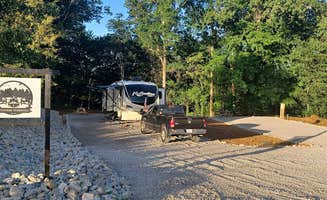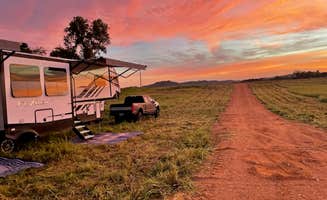Camping sites near Lexington, Tennessee offer varied terrain options from lakeside spots to forested settings at elevations between 400-600 feet. The region averages 54 inches of annual rainfall, creating lush vegetation throughout most campgrounds. Water levels in lakes like Pin Oak and Cub Lake fluctuate seasonally, affecting swimming conditions and boat launch accessibility.
What to do
Fishing opportunities: At Spring Creek Primitive Campground, visitors can fish directly from their campsites. One camper reported, "Kid caught over 20 fish and had a blast. The ranger took the kids on a fossil hunt. Great family feel to the whole place."
Swimming spots: The shallow waters at Beech Lake Family Camping Resort provide safe swimming conditions for younger visitors. The beach area gradually slopes, making it accessible for various age groups.
Fossil hunting: Several campgrounds organize ranger-led fossil hunts during summer months. A Spring Creek camper mentioned, "The ranger took the kids on a fossil hunt," showcasing educational opportunities beyond standard outdoor activities.
Horseback access: Natchez Trace Wrangler Camp caters specifically to equestrian campers with specialized amenities. A visitor explained, "The Wrangler Camp is for horse riders with water & electric hookups," noting its special purpose within the larger state park system.
Night sky viewing: Multiple campgrounds offer minimal light pollution for stargazing. One camper at Chickasaw State Park mentioned enjoying "seeing the expanse of the Milky Way" from the pier that spans the width of Lake Placid.
What campers like
Clean bathroom facilities: At Parkers Crossroads RV Park, visitors repeatedly mention the cleanliness standards. One camper noted, "Bathhouses were not fancy but cleaner than most, we were impressed."
Wildlife viewing: Several campgrounds feature waterfowl habitat areas. Ripple Valley Farms maintains natural areas that attract regional wildlife for observation throughout camping season.
Quiet atmosphere: Multiple reviewers cite peaceful conditions, especially at smaller campgrounds. A Parker Crossroads visitor shared, "It's not far off the interstate but far enough to feel like you are way off."
Level campsites: Many campgrounds have invested in site improvements. At Parkers Crossroads, a camper appreciated that "The pad site was concrete and level with full hook-ups."
On-site repairs: Unique to the region, Parkers Crossroads offers RV maintenance options. A camper explained, "They have some long term campers, storage, and an RV Repair Center on site. The shop inside has more parts then we have ever seen at an RV Park."
What you should know
Cell service limitations: Service varies significantly between campgrounds. At Cub Lake Campground #2, a visitor advised, "Make sure you download the map before you head in. There isn't cell service at least for Verizon."
Reservation requirements: Most campgrounds require advance booking during peak season (April-October). State park facilities can be reserved through Tennessee State Parks reservation systems.
Road access considerations: Access roads to primitive sites may require higher clearance vehicles. Some campground loops have narrow roads with tight turns.
Varying site sizes: Campground layouts differ significantly between facilities. A Parkers Crossroads camper noted, "Disclaimer here as not all sites in this CG are the same and some are quite nice with room between them."
Water conditions: Lake water clarity varies seasonally. Multiple campers mention brown water in summer months, which is typical for these Tennessee lakes and doesn't necessarily indicate pollution.
Tips for camping with families
Beach selections: Choose sites near swimming areas for convenience with children. A visitor to Pin Oak Campground mentioned, "There is a large lake on the campground that has a beach and swimming area."
Playground proximity: Several campgrounds feature multiple play areas. A Cub Lake camper noted, "There were several playgrounds around the campgrounds, I'm sure we tried them all."
Educational opportunities: Ranger programs operate during summer months. As one visitor mentioned, "The ranger took the kids on a fossil hunt," highlighting structured activities available to younger campers.
Campsite selection: For families, certain areas offer better amenities. A Cub Lake visitor advised, "We had an electric site around the corner from the beach, near an older playground and bathrooms."
Insect preparation: Waterfront sites require additional bug protection. A Spring Creek camper warned, "Bug spray is a must here, the mosquitoes are awful that close to the river."
Tips from RVers
Site leveling needs: Terrain varies across campgrounds, affecting setup difficulty. A Parkers Crossroads visitor mentioned, "We soon found out the site is not level and had to put leveling blocks under our door side wheels as they were off the ground after auto level."
Electric capacity: Most campgrounds offer 30-amp service with limited 50-amp availability. During peak summer months, electrical systems may become strained when all sites run air conditioning.
Water pressure variations: Some campgrounds have unusually high water pressure. A visitor to Chickasaw State Park Campground mentioned being "instructed to use a reducer as their water pressure is high."
Dump station access: Several campgrounds have limited dump station facilities. During busy checkout times (typically 10am-noon), lines can form at single-station facilities.
Site reservation specificity: Request exact site numbers when possible. A Parkers Crossroads camper advised, "When we asked how we could get into one of the sites in the 29-35 area, which had plenty of open sites during our stay, we were told those were for big rigs 40' and over."


